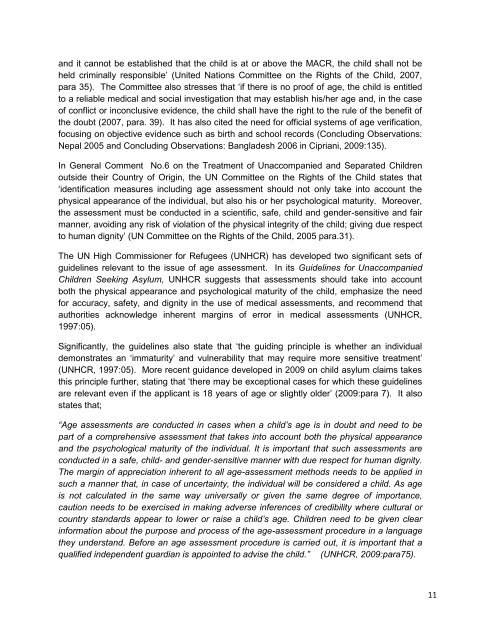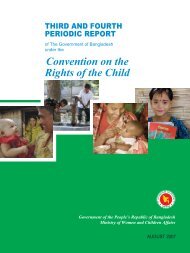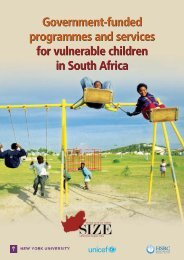Age assessment practices: a literature review & annotated ... - Unicef
Age assessment practices: a literature review & annotated ... - Unicef
Age assessment practices: a literature review & annotated ... - Unicef
You also want an ePaper? Increase the reach of your titles
YUMPU automatically turns print PDFs into web optimized ePapers that Google loves.
and it cannot be established that the child is at or above the MACR, the child shall not be<br />
held criminally responsible‟ (United Nations Committee on the Rights of the Child, 2007,<br />
para 35). The Committee also stresses that „if there is no proof of age, the child is entitled<br />
to a reliable medical and social investigation that may establish his/her age and, in the case<br />
of conflict or inconclusive evidence, the child shall have the right to the rule of the benefit of<br />
the doubt (2007, para. 39). It has also cited the need for official systems of age verification,<br />
focusing on objective evidence such as birth and school records (Concluding Observations:<br />
Nepal 2005 and Concluding Observations: Bangladesh 2006 in Cipriani, 2009:135).<br />
In General Comment No.6 on the Treatment of Unaccompanied and Separated Children<br />
outside their Country of Origin, the UN Committee on the Rights of the Child states that<br />
„identification measures including age <strong>assessment</strong> should not only take into account the<br />
physical appearance of the individual, but also his or her psychological maturity. Moreover,<br />
the <strong>assessment</strong> must be conducted in a scientific, safe, child and gender-sensitive and fair<br />
manner, avoiding any risk of violation of the physical integrity of the child; giving due respect<br />
to human dignity‟ (UN Committee on the Rights of the Child, 2005 para.31).<br />
The UN High Commissioner for Refugees (UNHCR) has developed two significant sets of<br />
guidelines relevant to the issue of age <strong>assessment</strong>. In its Guidelines for Unaccompanied<br />
Children Seeking Asylum, UNHCR suggests that <strong>assessment</strong>s should take into account<br />
both the physical appearance and psychological maturity of the child, emphasize the need<br />
for accuracy, safety, and dignity in the use of medical <strong>assessment</strong>s, and recommend that<br />
authorities acknowledge inherent margins of error in medical <strong>assessment</strong>s (UNHCR,<br />
1997:05).<br />
Significantly, the guidelines also state that „the guiding principle is whether an individual<br />
demonstrates an „immaturity‟ and vulnerability that may require more sensitive treatment‟<br />
(UNHCR, 1997:05). More recent guidance developed in 2009 on child asylum claims takes<br />
this principle further, stating that „there may be exceptional cases for which these guidelines<br />
are relevant even if the applicant is 18 years of age or slightly older‟ (2009:para 7). It also<br />
states that;<br />
“<strong>Age</strong> <strong>assessment</strong>s are conducted in cases when a child‟s age is in doubt and need to be<br />
part of a comprehensive <strong>assessment</strong> that takes into account both the physical appearance<br />
and the psychological maturity of the individual. It is important that such <strong>assessment</strong>s are<br />
conducted in a safe, child- and gender-sensitive manner with due respect for human dignity.<br />
The margin of appreciation inherent to all age-<strong>assessment</strong> methods needs to be applied in<br />
such a manner that, in case of uncertainty, the individual will be considered a child. As age<br />
is not calculated in the same way universally or given the same degree of importance,<br />
caution needs to be exercised in making adverse inferences of credibility where cultural or<br />
country standards appear to lower or raise a child‟s age. Children need to be given clear<br />
information about the purpose and process of the age-<strong>assessment</strong> procedure in a language<br />
they understand. Before an age <strong>assessment</strong> procedure is carried out, it is important that a<br />
qualified independent guardian is appointed to advise the child.” (UNHCR, 2009:para75).<br />
11
















